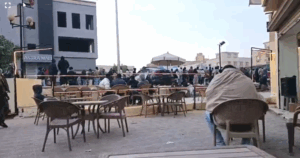At least 138 have died in ongoing West Darfur attacks while Jebel Moon leaders sign non-aggression pledge
At least 138 have now died in the violence that erupted in West Darfur recently. Leaders of Arab tribes and the Misseriya tribe signed a non-aggression pledge yesterday concerning the conflict in Jebel Moon, which has cost the lives of at least 42. Attacks continued in other areas.
 Displaced families in El Geneina, West Darfur (Modesta Ndubi/UNHCR)
Displaced families in El Geneina, West Darfur (Modesta Ndubi/UNHCR)
At least 138 have now died in the violence that erupted in West Darfur recently. Leaders of Arab tribes and the Misseriya tribe signed a non-aggression pledge yesterday concerning the conflict in Jebel Moon, which has cost the lives of at least 42. Attacks continued in other areas.
The West Darfur Doctors Committee reported yesterday that new attacks on villages in Jebel Moon on Wednesday led to more deaths and injured, property losses, and the burning of villages.
The Doctors Committee counted 25 deaths and four wounded as a result of these events. Another eight people were killed and six were injured near the village of Tanjikei in Sirba locality, adjacent to Jebel Moon locality.
This brings the number of casualties documented by the West Darfur Doctors’ Committee since November 17 in Kereinik, Jebel Moon, and Sirba to 138 dead and 106 wounded.
'The state has left millions of civilians facing their unknown fate, burying dozens of their relatives. Some of them are in mass graves, awaiting the toll of tomorrow's victims' – West Darfur Doctors Committee
“It is worth noting that many of the wounded die because of the difficulty of getting them to medical facilities in a timely manner, as well as the lack of rural hospitals with the necessary capabilities to save them, and this explains the number of deaths exceeding the number of wounded,” the doctors’ statement read.
“These tragedies are added to the massacres sweeping the region, especially West Darfur, in the absence of any indication of the government’s desire to protect the lives and property of civilians, and the complete inability to take any step to impose the Rule of Law. The state has left millions of civilians facing their unknown fate, burying dozens of their relatives. Some of them are in mass graves, awaiting the toll of tomorrow's victims.”
Non-aggression pledge
Leaders of Arab tribes and the Misseriya tribe signed a document in El Geneina yesterday pledging non-aggression in the Jebel Moon conflict that has unfolded in West Darfur.
The document was signed by 29 leaders of the Arab and Misseriya tribes, along with witnesses from other tribes.
The agreement stipulates the commitment of the two parties and obligates them and their affiliates not to attack until the convening of a peace conference. The two parties agreed to legal accountability in the event of a breach of the agreement.
Ongoing attacks
Gunmen also torched the villages of Gargar and Lowi, north of Azerni, close to Kereinik in West Darfur, yesterday.
People from the area told Radio Dabanga that the gunmen plundered the two villages after setting fire to the housews. Many villagers fled to Azerni.
The sources said that the gunmen closed all roads linking Azerni with El Geneina and blamed the regular forces for their absence and their failure to play their role in maintaining security.
The bodies of seven people, including Omda (tribal leader) Gamareldin Ibrahim, were buried in El Geneina yesterday. They were killed on the road between El Geneina and Anjeeki on Wednesday.
A listener from the area told Radio Dabanga that armed men intercepted the victims while they were on their way from El Geneina to a funeral in the area of Marhaha, east of El Geneina, and shot them dead.
North Darfur violence
In North Darfur, armed men burned a number of houses in the village of Lyun Hillet Sheikh Mohamed El Kheir in Dar El Salam yesterday.
The thousands of newly displaced villagers who fled to Zamzam camp as a result of the burning of their villages in Tawila and Dar El Salam on Monday now live in tragic humanitarian conditions. While the camp witnessed a cautious calm, the market and schools were partially reopened yesterday.
One of the displaced living in Zamzam camp, west of El Fasher, told Radio Dabanga that the new displaced are hosted in three areas, near the Amgeigou Gate, the Abuzereiga Gate, and the Saloma Gate. He explained that the displaced left all their belongings in their villages and now suffer from the bitter cold.
He called on the United Nations agencies to provide non-food items. He indicated that the regular forces were stationed west and east of Zamzam camp to protect the camp from possible attacks.

OCHA report
The United Nations Office for Humanitarian Affairs (OCHA) in Sudan reported that tensions remain high in Kereinik, El Geneina, and Jebel Moon in West Darfur, Azum in Central Darfur, and the area of El Fasher in North Darfur. OCHA said in its report on Thursday that at least 15,500 people displaced following inter-communal conflict in Kereneik locality alone.
It also reported that about 6.2 million people, including displaced, returnees, refugees, and vulnerable people, will need humanitarian assistance in the Darfur region in 2022, according to the 2022 Sudan Humanitarian Needs Overview (HNO).
In Kereinek, a confrontation between two people triggered fierce fighting between nomads and Masalit tribesmen in Kereneik town on 4 December. At least 42 people were killed in the violence. In Jebel Moon, inter-communal clashes between nomads and farmers from the Misseriya Jebel tribe escalated in mid-November, affecting at least 9100 people. 771 houses were looted and burned in the area, and 29 children and 16 adults are missing, OCHA reported.
The report also pointed to the failure of the agricultural season in West Darfur due to the lack of rain and the spread of pests, in addition to the displacement of livestock.
US Embassy statement
At the international level, the US Embassy in Khartoum expressed its “deep concern” about the recent violence in Darfur, West Kordofan, and South Kordofan.
“Dozens have been killed and thousands displaced from their homes, directly contrary to the aspirations of the Juba Peace Agreement,” the statement read.
“We call for the violence to cease immediately and urge the Sudanese government and its partners among the JPA signatories to put effective plans in place that will ensure protection of civilians.”
'Dozens have been killed and thousands displaced from their homes, directly contrary to the aspirations of the Juba Peace Agreement' US Embassy
Plan to restore security
Rebel leader and member of the Transitional Sovereignty Council, El Hadi Idris, announced a plan that was approved to restore security and stability in the region.
He made it clear during his meeting with Acting Governor of Darfur Mohamed Aliyu yesterday that the plan is being implemented by a joint force with special tasks, consisting of the Sudan Armed Forces, the paramilitary Rapid Support Forces (RSF), former rebel combatants, and police forces.
The Dar Masalit Displaced and Refugees Association has renewed its demand to exclude the RSF militia from the mandate and called for a UN intervention under Chapter VII of protection.
In a statement yesterday, the Association appealed to international, regional, and national humanitarian and human rights organisations to intervene as soon as possible to provide the necessary assistance to alleviate suffering.
The RSF are widely believed to be responsible for many of the atrocities in Darfur, including genocide.
SCP
The Sudanese Congress Party (SCP) holds the Sudanese authorities fully responsible for the current violence in Darfur and Kordofan.
The crimes committed in these regions “reflect the consequences of the army leadership's preoccupation with politics rather than focusing on its professional duties,” the party said in a statement yesterday.
The SCP added that the continuing attacks require rapid intervention to rescue the wounded and aid the new displaced, and to then conduct the necessary investigations from the local, regional, and international judicial authorities.











 and then
and then